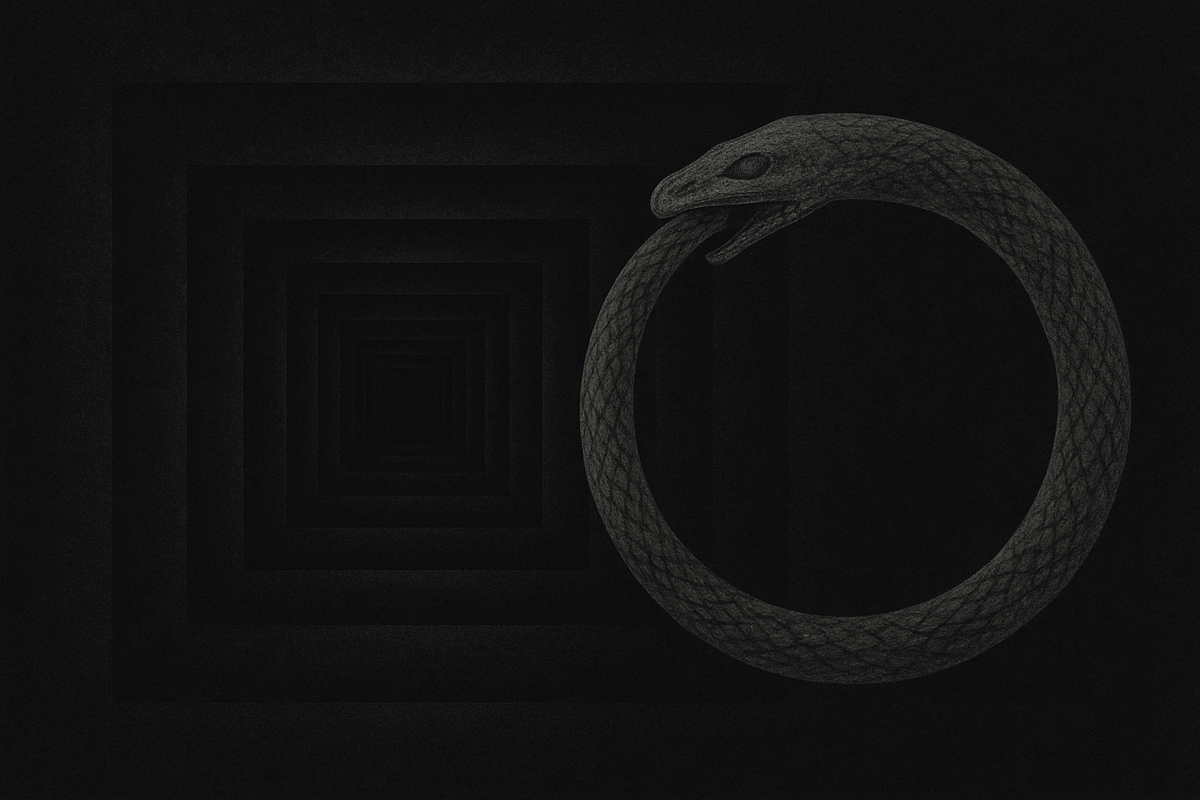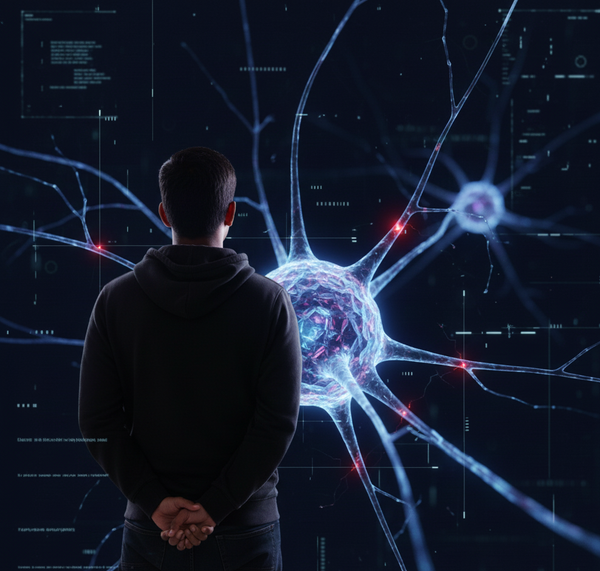Self reference and infinite regress: the fatal limitations of any academic discipline

Each academic discipline emerges from foundational assumptions made by specific individuals and communities of practitioners. These historically contingent choices become institutionalized and largely invisible, shaping what can be seen, what questions can be asked, and what counts as valid explanation.
The problem of self-reference arises because the foundational concepts in each domain often contain—implicitly or explicitly—the very ideas practitioners attempt to explain. This creates an inescapable circularity.
Enlarging the scope of a domain in an attempt to escape the circularity only relocates the problem. The expanded domain inherits new foundational concepts, which themselves produce a new circularity. Infinite regress offers no escape.
Below are examples of various disciplines, the concepts on which they are founded, examples of questions they can answer, and examples of questions that expose circularity.
Notice the common structure across all these historically developed disciplines:
- Historical choices by specific individuals and communities about what entities and processes to treat as foundational
- Institutionalized methods for manipulating these chosen entities through training, research practices, and academic structures
- Explanatory traditions that reduce higher-level phenomena to interactions among the historically chosen foundations
Biology
When Darwin, Mendel, Watson, Crick, and subsequent generations of biologists developed biological theories, they chose to start with concepts like:
- organisms, genes, cells, proteins, RNA, DNA, enzymes, metabolic pathways, evolutionary processes
These practitioners used processes, typically expressed mathematically or computationally, to reason about higher-level concepts:
- Population geneticists developed mathematical models to explain species evolution
- Molecular biologists created computational processes to explain gene expression
- Ecologists adopted systems theory to explain ecosystem dynamics
- Developmental biologists used regulatory network models to explain morphogenesis
Mathematics
When Euclid, Newton, Cantor, Hilbert, and generations of mathematicians developed mathematical systems, they chose to start with abstract objects:
- numbers (natural, rational, real, complex), sets, functions, geometric objects, algebraic structures, topological spaces
These communities used formal operations and rules to reason about higher-level concepts:
- Arithmetic operations to build algebraic systems
- Set operations to construct mathematical structures
- Logical inference to derive theorems
- Proof procedures to establish mathematical truth
Logic
When Aristotle, Boole, Frege, Russell, and subsequent logicians developed logical systems, they chose to start with foundational concepts:
- propositions, truth values (true/false), logical connectives (and, or, not, implies), inference rules, validity, soundness
These practitioners used formal operations to reason about higher-level concepts:
- Truth tables to define logical operations
- Proof systems to establish logical validity
- Model theory to relate syntax and semantics
- Formal languages to express logical relationships
Computer Science
When Turing, von Neumann, and subsequent computer scientists developed computational theories, they chose to start with foundational concepts:
- data structures (arrays, lists, trees, graphs), algorithms, computational processes, formal languages, automata, bits, memory, processors
These communities used formal manipulation and computational processes:
- Algorithmic procedures to solve computational problems
- Data transformations to process information
- State machines to model system behavior
- Complexity analysis to evaluate computational efficiency
Physics
When Newton, Maxwell, Einstein, and subsequent physicists developed physical theories, they chose to start with foundational concepts:
- particles, fields, forces, space, time, energy, mass, charge, quantum states, wave functions
These communities used mathematical laws and equations to reason about higher-level concepts:
- Differential equations to describe system evolution
- Statistical mechanics to explain thermodynamic properties
- Quantum mechanics to explain atomic and molecular behavior
- Relativity to explain spacetime structure
Philosophy
When Plato, Aristotle, Descartes, Kant, and subsequent philosophers developed philosophical systems, they chose to start with foundational concepts:
- concepts, arguments, propositions, truth, knowledge, existence, consciousness, meaning, rationality, logic
These thinkers used rational discourse and conceptual analysis:
- Logical argumentation to establish philosophical positions
- Conceptual distinctions to clarify meanings
- Thought experiments to test intuitions
- Dialectical reasoning to explore opposing viewpoints
Economics
When Adam Smith, Ricardo, Marshall, Keynes, and subsequent economists developed economic theories, they chose to start with foundational concepts:
- rational agents, preferences, utility, markets, prices, supply, demand, equilibrium, information
These communities used mathematical models and computational processes:
- Optimization theory to explain decision-making
- Game theory to explain strategic interactions
- Statistical analysis to test economic hypotheses
- Mathematical models to predict market behavior
Psychology
When William James, Freud, Skinner, cognitive scientists, and subsequent psychologists developed psychological theories, they chose to start with foundational concepts:
- mind, behavior, cognition, emotion, learning, memory, perception, personality, consciousness
These communities used experimental methods and theoretical models:
- Statistical analysis of behavioral data
- Cognitive models of information processing
- Neural network models of learning and memory
- Computational models of decision-making
The Self-Referential Trap
Here are examples of the circularity in those domains.
Biology: The foundational concepts (proteins, DNA, cells, enzymes, metabolic pathways) all presuppose that they are manifestations of "life"—but "life" is the implicit organizing concept of the entire biological domain. When biologists try to explain what life is, they must use concepts that already assume the distinction between living and non-living. You cannot explain life within biology without circular reasoning—the concept of life is embedded in every foundational concept the discipline uses.
Mathematics: The foundational concepts (numbers, sets, functions, proofs) all presuppose "mathematical truth"—but mathematical truth is what mathematics claims to establish. When mathematicians try to prove that mathematical reasoning is reliable, they must use mathematical reasoning itself. Gödel demonstrated that mathematics cannot prove its own consistency without assuming what it's trying to prove. The concept of mathematical truth is embedded in every mathematical operation, yet cannot be established mathematically.
Logic: The foundational concepts (propositions, inference rules, validity) all presuppose "logical correctness"—but logical correctness is what logic claims to determine. When logicians try to establish that logical reasoning is valid, they must use logical reasoning. The concept of logical validity is embedded in every logical operation, yet cannot be established logically without circularity.
Computation: The foundational concepts (algorithms, data structures, information processing) all presuppose "computational meaning"—but computational meaning is what computer science tries to explain. When computer scientists try to determine whether intelligence is computational, they must use computational methods. The concept of computation is embedded in every computational analysis, yet cannot be established computationally.
Physics: The foundational concepts (particles, fields, forces, energy) all presuppose "physical reality"—but the nature of physical reality is what physics claims to investigate. When physicists try to explain what makes something physical, they must use physical concepts. The concept of "the physical" is embedded in every physical measurement, yet cannot be established physically.
Philosophy: The foundational concepts (rationality, truth, knowledge, existence) all presuppose "philosophical understanding"—but philosophical understanding is what philosophy claims to achieve. When philosophers try to establish that rational argument leads to truth, they must use rational argument. The concept of rationality is embedded in every philosophical analysis, yet cannot be established rationally without circularity.
This creates a peculiar situation: each disciplinary community becomes most competent within its historically chosen domain but helpless when asked to justify or examine the domain-defining concepts themselves. The methods that work so well for investigating phenomena within the inherited conceptual framework cannot be turned reflexively on the framework's own foundations without creating circularity or infinite regress.
The Impossibility of Self-Grounding:
Each domain faces questions it cannot answer using its own methods:
- Can mathematicians prove that mathematical proof is valid using mathematical methods? (No—this requires assuming mathematical validity to prove mathematical validity)
- Can logicians demonstrate that logical reasoning is sound using logical reasoning? (No—this requires assuming logical soundness to prove logical soundness)
- Can computer scientists determine whether thinking is computational using computational methods? (No—this requires assuming computational thinking to analyze computational thinking)
- Can physicists explain the physical basis of doing physics using physical methods? (No—this requires assuming physical reality to establish physical reality)
- Can biologists explain what life is using biological methods? (No—this requires assuming the concept of life to define life)
- Can philosophers establish the validity of rational discourse using rational discourse? (No—this requires assuming rationality to prove rationality)
The Hidden Circularity:
What makes this particularly subtle is that the domain-defining concepts are often implicit rather than explicit. Biologists rarely ask "What is life?" directly—they assume they know what living things are and proceed to study them. Mathematicians rarely ask "What is mathematical truth?"—they assume they know what mathematical validity means and proceed to prove theorems. The circular dependency remains hidden because the foundational concepts are taken for granted rather than examined.
Yet these hidden foundational concepts shape everything that can be seen, asked, or discovered within each domain. They are simultaneously the most important concepts in each field and the ones that cannot be investigated using the field's own methods.
Rather than being eternal features of reality, disciplinary boundaries represent contingent historical choices that became institutionalized through education, research funding, academic departments, and professional communities. Different choices by different people at crucial historical moments could have led to entirely different ways of organizing human knowledge.
The disciplinary communities can pose questions, but their institutionalized methods cannot answer them without self-reference problems. This doesn't invalidate these disciplines, but it reveals their partial and provisional character. Each offers a particular lens for engaging with reality developed by specific historical communities, but none provides a complete or self-grounding account of what it studies—and crucially, none can examine its own historically inherited lens using that very lens.




